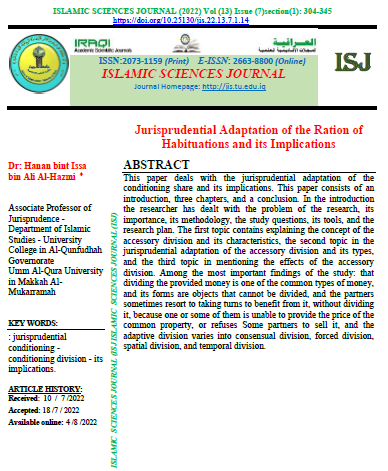Jurisprudential Adaptation of the Ration of Habituations and its Implications
Main Article Content
Abstract
This paper deals with the jurisprudential adaptation of the conditioning share and its implications. This paper consists of an introduction, three chapters, and a conclusion. In the introduction the researcher has dealt with the problem of the research, its importance, its methodology, the study questions, its tools, and the research plan. The first topic contains explaining the concept of the accessory division and its characteristics, the second topic in the jurisprudential adaptation of the accessory division and its types, and the third topic in mentioning the effects of the accessory division. Among the most important findings of the study: that dividing the provided money is one of the common types of money, and its forms are objects that cannot be divided, and the partners sometimes resort to taking turns to benefit from it, without dividing it, because one or some of them is unable to provide the price of the common property, or refuses Some partners to sell it, and the adaptive division varies into consensual division, forced division, spatial division, and temporal division
Article Details

This work is licensed under a Creative Commons Attribution 4.0 International License.
COLLEGE OF ISLAMIC SCIENCES, TIKRIT UNIVERSITY. THIS IS AN OPEN ACCESS ARTICLE UNDER THE CC BY LICENSE http://creativecommons.org/licenses/by/4.0/

